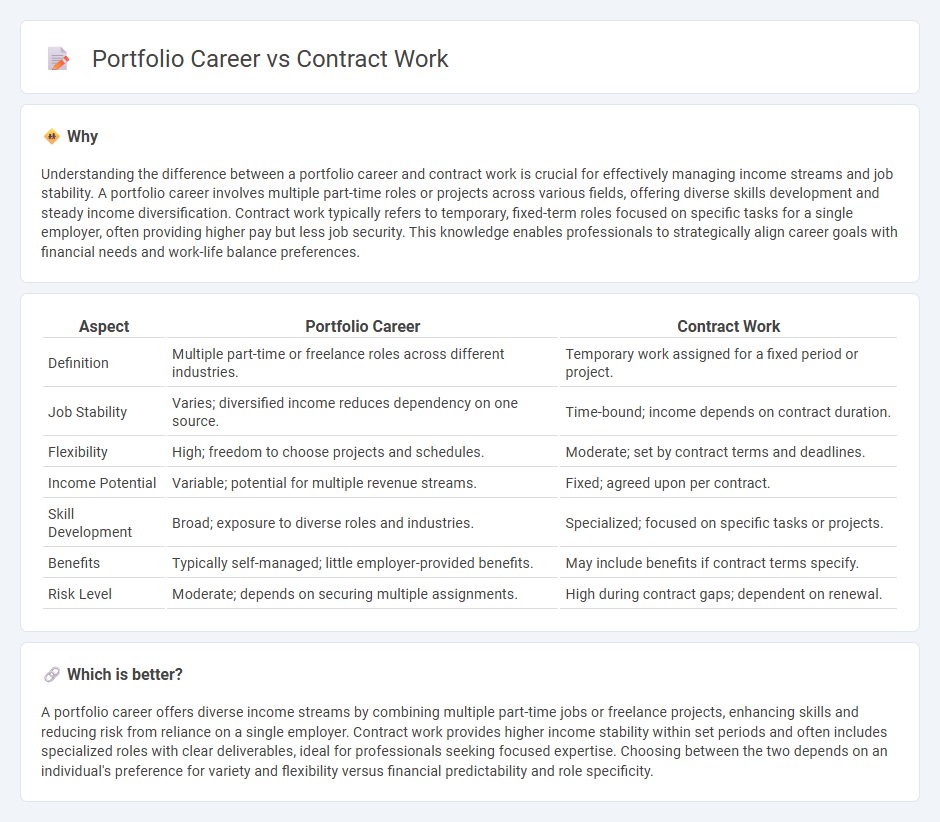
A portfolio career involves multiple part-time roles or projects across various fields, offering diverse skills and income streams for professionals seeking flexibility and growth. Contract work focuses on specific engagements with fixed terms, providing specialized expertise and typically higher pay for defined projects or durations. Explore the benefits and challenges of each to determine the best fit for your career goals.
Why it is important
Understanding the difference between a portfolio career and contract work is crucial for effectively managing income streams and job stability. A portfolio career involves multiple part-time roles or projects across various fields, offering diverse skills development and steady income diversification. Contract work typically refers to temporary, fixed-term roles focused on specific tasks for a single employer, often providing higher pay but less job security. This knowledge enables professionals to strategically align career goals with financial needs and work-life balance preferences.
Comparison Table
| Aspect | Portfolio Career | Contract Work |
|---|---|---|
| Definition | Multiple part-time or freelance roles across different industries. | Temporary work assigned for a fixed period or project. |
| Job Stability | Varies; diversified income reduces dependency on one source. | Time-bound; income depends on contract duration. |
| Flexibility | High; freedom to choose projects and schedules. | Moderate; set by contract terms and deadlines. |
| Income Potential | Variable; potential for multiple revenue streams. | Fixed; agreed upon per contract. |
| Skill Development | Broad; exposure to diverse roles and industries. | Specialized; focused on specific tasks or projects. |
| Benefits | Typically self-managed; little employer-provided benefits. | May include benefits if contract terms specify. |
| Risk Level | Moderate; depends on securing multiple assignments. | High during contract gaps; dependent on renewal. |
Which is better?
A portfolio career offers diverse income streams by combining multiple part-time jobs or freelance projects, enhancing skills and reducing risk from reliance on a single employer. Contract work provides higher income stability within set periods and often includes specialized roles with clear deliverables, ideal for professionals seeking focused expertise. Choosing between the two depends on an individual's preference for variety and flexibility versus financial predictability and role specificity.
Connection
Portfolio careers often comprise multiple contract work arrangements that allow professionals to diversify income streams and skill sets. Contract work provides the flexibility necessary for managing various projects simultaneously within a portfolio career framework. This synergy enhances career resilience and adaptability in dynamic job markets.
Key Terms
Flexibility
Contract work offers flexibility through fixed-term agreements allowing professionals to choose projects and manage their time independently. A portfolio career combines multiple income streams from diverse roles, providing adaptability and the ability to pivot across industries. Explore the benefits of each approach to find the best fit for your lifestyle and goals.
Job Security
Contract work offers less job security due to fixed-term agreements and project-dependent roles, making income unpredictable. Portfolio careers combine multiple income streams across varied projects, enhancing job stability through diversification and flexibility. Explore more to understand how each option impacts long-term financial security and career growth.
Skill Diversification
Contract work often involves specialized, project-based tasks that enhance expertise within a specific skill set, while a portfolio career encourages skill diversification by combining multiple roles across various industries, fostering adaptability and broader professional growth. Building a portfolio career allows individuals to develop complementary skills in areas such as marketing, design, and consultancy, creating a dynamic and resilient career path. Explore how diversifying your skillset through portfolio careers can unlock new opportunities and long-term career stability.
Source and External Links
What Is a Contract Job, and How Does It Work in 2025? - Upwork - A contract job involves hiring a worker for a specific task with a fixed timeframe and payment, offering flexibility for both businesses and professionals who want to work project-based or seasonally.
Independent contractor (self-employed) or employee? - IRS - A key distinction in contract work is between being an independent contractor, responsible for self-employment taxes with no employer tax withholding, versus being a traditional employee with tax and benefit obligations handled by the employer.
Contractor Opportunities | The Cigna Group Careers - Contract roles can serve as temporary assignments with options for flexibility, benefit eligibility through the vendor, and often the possibility to transition into permanent full-time positions.
 dowidth.com
dowidth.com